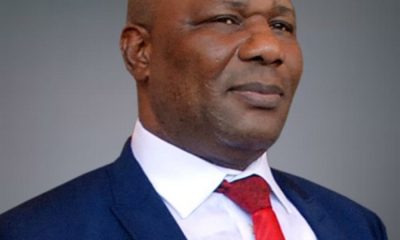Economy
SEC Boss Urges Senior Bankers to Mentor Younger Generation

The Director General of the Securities and Exchange Commission, Malam Lamido Yuguda, has urged senior bankers to mentor the younger generation so as to ensure sustainability, safety and soundness of the banking and finance industry.
Lamido gave the advice at the relaunch of the CIBN Mentoring Scheme, with theme, “Mentoring: Unlocking Career Potentials and Possibilities”, on Thursday in Lagos.
He said that their commitment to mentoring the younger generation would go a long way in actualising the objectives of the institute’s mentoring scheme.
The aim of the scheme is to mold, shape and transform the minds of young and upcoming professionals in the banking and finance industry.
It was first launched in 2012 as a capacity building initiative to address some of the needs and gaps identified in the industry.
The relaunch was necessitated by the fact that the scheme had been fortified and enriched with more features for the benefit of all participants and would be participants.
Running on a mobile responsive user friendly application, it went live on June 17, 2020, with over 600 mentors and mentees nominated by managing directors of banks in Nigeria.
Lamido said: “Let me use this opportunity to encourage senior bankers to collaborate with CIBN in actualising the objectives of the mentoring scheme.
“Your commitment to mentoring the younger generation will go a long way in ensuring the sustainability safety and soundness of the banking industry.
“To the young bankers, I enjoin you to make the best use of this rare opportunity! I am confident that with the cooperation of all stakeholders, the CIBN mentoring scheme will be a point of reference for others,” he said.
Lamido said that to be a successful professional, one must be ambitious, willing to go the extra mile, try to be a value enhancer and must be outstanding.
He said that such a person must be teachable and willing to learn from other persons who are deemed successful in the same career path.
According to him, it is critical for young bankers to be mentored by seasoned senior colleagues as they progress in their careers because the banking profession is predicated on trust and professionalism. .
He said that these values could be taught but are actually reinforced when demonstrated by senior bankers and emulated by their younger colleagues.
” Due to the peculiarities of the banking industry, it is easy for young bankers to get distracted with the prestige and sometimes material benefits that come with the profession.
” However, mentorship relationships help to keep such young professionals grounded and focused on building character, advancing their knowledge, growing their professional network and cultivating the right values.
” This is important because what makes success sustainable for a professional is a combination of skill, experience and the right values,” the SEC director general said.
A former Company Secretary, FBN Holdings Plc, Mr Tijani Borodo, urged professionals in the banking and finance industry to imbibe good attributes in their profession and in their personal lives.
“There are three Cs which I call the attributes of a good leader, that is, character, capacity and competency.
“For you to be a banker, you must have character; and if you are a trustworthy person, and you are honest, the chances are you have character; and if you have that, the banking industry and the regulators are there to ensure there is professionalism, capacity and competency in you and all others in the banking industry,” he said.
Mrs Nneka Okekearu, the Deputy Director, Enterprise Development Centre, Pan Atlantic University, said that a perfect mentoring plan must be built on trust, impact, partnership, skills enhancement, collaboration and tracking.
” For there to be a perfect mentoring, there must be trust in the process, they must trust that we are not using it for appraisal and that the conversation stays between the two parties.
“There must also be impact! that is, something that we are working toward, and if you do not see that taking part, then you begin to question whether anything took place.
“There must be partnership between the mentor and mentees so that the desired objectives would be achieved.
“Skills must be enhanced in the process and must be done with collaboration and lastly, we should be able to go back and check the trust to ensure that with the mentoring process, the mentoring actually did take place.
“After the six months mentoring or whatever time schedule, you go back and check that track and see if indeed there has been any improvement whatsoever to that particular mentee.
“With the tracking, we will be able to check and ensure that we are on course and our objectives had been achieved,” she said.
Earlier, the CIBN President, Mr Bayo Olugbemi, said that the Institute had identified mentoring as a potent tool for bridging the gap between learning and doing.
“Esteemed audience, the changing times requires that we do things differently; the changing times require that we do things differently.
“At the CIBN, we believe so much that to maintain safety, soundness and stability of the banking industry, the human capital has a pivotal role to play in this wise.
“We have identified mentoring as a potent tool for bridging the gap between learning and doing.
“In order to uphold ethics and professionalism which is the hallmark of our banking industry and our great institute, accomplished and experienced bankers need to mentor the young and upcoming ones in order to sustain the ideals of our I ndsutry,” he said. (NAN)
Economy
SEC Advocates Advanced Financial Inclusion by 2030

By Tony Obiechina, Abuja
The Securities and Exchange Commission (SEC) has stressed the need for Nigeria to harness its demographic dividend to advance financial inclusion through investments by 2030 for national survival or face deepening inequality.
The Director-General of the SEC, Dr Emomotimi Agama said this at the United Capital Asset Management Investment forum on Wednesday in Lagos.
Agama, in his keynote address titled: “Advancing Financial Inclusion through Investments: Bridging
Nigeria’s Knowledge and Wealth Gap,” said Nigeria must harness its demographic dividend to boost investment.
“Our theme, Advancing Financial Inclusion through Investments, is not aspirational; it is foundational to national survival.
“We stand at a pivotal moment. By 2030, Nigeria can either harness its demographic dividend or face deepening inequality. The knowledge-wealth gap is not merely an economic challenge; it is a moral imperative,” Agama said.
He said the term inclusion should be reframed as active financial involvement, where access meets empowerment, and capital becomes a tool for transformation.
Agama said that closing the financial inclusion gender gap could lift 700,000 Nigerians from poverty.
He said, “Nigeria has a great population yet we have a tiny drop of this number of persons involved in the capital market.
“That one reason for poverty, because we are running from money. We have to do something. Our market capitalisation is an opportunity to do something,
We all have
“We need to change the narrative and move the market forward. We must reach out to make the difference. We are committed to protecting investors and developing the market. Our goal is to do the right thing no matter whose ox is gored. We will work by the principles of fairness and equity to change the market. We will provide a fair ground for everyone to aspire.
He noted that MTN Nigeria’s share offering drew 150,000 new investors – 75 per cent women, 85 per cent under 40.
Agama recommended a four-pillar strategy for bridging the gaps.
He listed the four-pillar strategy as democratisation of financial knowledge, catalyse MSME Investment Channels, blended Finance Vehicles: Partner with Bank of Industry (BOI) to de-risk loans for women-led SMEs.
“We need to educate people about finances. As we drive this market, we do so for a purpose, I enjoin everyone to be the disciple and the apostles. Getting this market to move is a deliberate action,” he added.
| ReplyReply allForwardAdd reaction |
Economy
NPA Assures of Over N1.27trn Revenue in 2025

By Ubong Ukpong, Abuja
The Nigerian Ports Authority (NPA) on Monday assured that it would take into the coffers massive revenue of over N1.27 trillion in 2025, representing a 40 percent increase from the N894.86 billion it realized in 2024.
This ambitious target, the Authority said, was anchored on sweeping modernization efforts, the full activation of the Dangote Refinery’s marine operations, and the deployment of cutting-edge technology to enhance port efficiency.
Managing Director of the NPA, Abubakar Dantsoho, disclosed this in a presentation during his agency’s budget defence session wih the House of Representatives Committee on Ports and Harbours, where he defended the agency’s 2025 budget estimates and provided insights into its 2024 performance.
“Our 2025 budget proposal is more than figures, it reflects our aspirations for a more efficient, globally competitive port system,” Dantsoho told lawmakers, adding that over 70% of the proposed expenditure will go into capital projects.
For 2024, the Authority surpassed its revenue target of N865.39 billion, posting an actual realization of N894.86 billion.
However, Dantsoho revealed that only N417.86 billion, less than half of the approved N850.92 billion expenditure, had been spent as of the time of reporting.
Despite this, NPA made a record contribution of N400.8 billion to the Consolidated Revenue Fund (CRF) in 2024, nearly double the N213.23 billion remitted in 2023. Of this amount, a staggering N344.7 billion was deducted at source.
“This shows our unwavering commitment to national revenue generation, even when our own operational liquidity is affected,” the NPA boss stressed.
Dantsoho said the projected revenue increase is premised on several key assumptions and developments, including: The full operation of the Dangote Refinery, which alone is expected to draw in over 600 vessels annually through its Single Point Mooring (SPM) system; the commissioning of upgraded terminals at WACT and OMT, which will enhance container traffic; the implementation of automation tools such as the National Single Window, Port Community System (PCS), and Vessel Traffic Management System (VTMS); and increased cargo volumes stemming from global disruptions, including the Russia-Ukraine conflict, which has affected global trade routes.
He said the 2025 revenue is expected to come from the following key sources: Ship Dues, N544.06 billion; Cargo Dues, N413.06 billion; Concession Fees, N249.69 billion; and Administrative Revenue, N73.07 billion
Of the proposed N1.14 trillion total expenditure for 2025, N778.46 billion is earmarked for capital projects.
This investment, he said, will target the revitalization of critical infrastructure, including the Calabar, Warri, and Burutu ports and channels, and enhance towage services, channel depth, and compliance with international security conventions.
“Investments in infrastructure and technology are non-negotiable if we are to stay competitive regionally and globally,” Dantsoho emphasized.
He cited increasing competition from neighboring ports and aging assets across Nigeria’s coastal corridors.
The NPA also intends to address technology gaps by upgrading legacy systems and bolstering cybersecurity, ensuring Nigerian ports meet global standards for digital operations.
“We can say that with timely access to internally generated revenue and capital funds NPA would deliver the kind of impact Nigeria expects,” he said.
Chairman of the Committee, Hon. Nnolim Nnaji, urged the NPA to ramp up performance, improve port infrastructure, and play a greater role in addressing Nigeria’s revenue and unemployment challenges.
Nnaji said the ports remain a critical pillar of Nigeria’s economy, and urged the agency to meet rising expectations despite operational challenges.
“No country can thrive economically without high-performing ports. They are the economic heartbeat of every nation, determining how buoyant a country is through the flow of imports and exports,” Hon Nnaji said.
The committee praised NPA for its performance.
Nnaji stressed that the NPA’s performance has implications beyond maritime activity, noting that increased port output can significantly boost job creation across several sectors.
“The Nigerian Ports Authority is not just a revenue-generating agency, it is a national asset in terms of employment and economic impact.
“We expect to see detailed strategies on how to improve revenue generation and expand employment opportunities through your 2025 budget,” he said.
The lawmaker also pointed to growing interest in the development of new ports across the country but cautioned against neglecting existing port infrastructure.
“As we welcome investment in new ports, we must not abandon the old ones. Maintaining and upgrading our existing ports, both in the Eastern Corridor and the Western axis, is essential to long-term sustainability,” he added.
The Committee called for a clear outline from the NPA on how its 2025 financial plan will address pressing national concerns and reaffirm Nigeria’s competitiveness in regional and global maritime trade.
Economy
Senate Sets N10trn Revenue Target for NCS, Urges Agency to Curb Smuggling, Illicit Drugs

By Eze Okechukwu, Abuja
The Senate, through its Committee on Customs has set a revenue target of N10 trillion for the Nigeria Customs Service for the 2025 fiscal year, instead of the initial N6.584 trillion given to her earlier on while urging the agency to clamp down on smuggling and Illicit drugs.
The Chairman of the Committee, Senator Isah Jibrin (Kogi East), who gave the agency the marching order yesterday in Abuja during the budget defence of the revenue driving agency however commended her for exceeding its 2024 revenue target of N5.
079 trillion.The NCS team led by Deputy Comptroller General, Jibo Bello who represented the Comptroller General presented the 2024 budget performance with a revenue target of N5.
079 trillion, stressing that the proposal was exceeded by over a trillion naira.The Committee, obviously impressed by the performance commended NCS before asking them to go ahead and present the 2025 budget proposal, which the agency tied at N6.584 trillion revenue target with an expenditure of N1.132 trillion.
Following their presentation, members of the Senate Committee on Customs unanimously approved the recommendation of the revenue target of N6.584 trillion and the expenditure of N1.132 trillion for the 2025 financial year.
The Committee will subsequently present the budget proposal to the Senate at plenary most likely this week as the red chamber resumes today after a long recess tied to Eid celebration.
In his final remarks, Senator Jibrin emphasised the need for the NCS to rise up in terms of its surveillance with respect to illicit drugs and smuggling “to ensure that, as much as possible, you should be on top of your game”.
He said there are so many illicit drugs flowing all over the place, which according to him “is contributing to the issue of banditry in Nigeria because most of these guys are on drugs. What I’m saying is that, in addition to your revenue drives, you should also be mindful of some of these other functions.

























